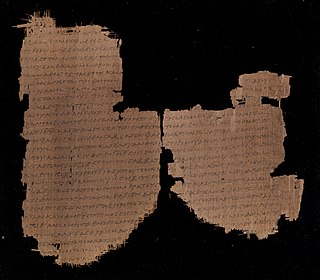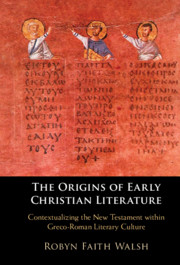
The Gospel of Luke tells of the origins, birth, ministry, death, resurrection, and ascension of Jesus Christ. Together with the Acts of the Apostles, it makes up a two-volume work which scholars call Luke–Acts, accounting for 27.5% of the New Testament. The combined work divides the history of first-century Christianity into three stages, with the gospel making up the first two of these – the life of Jesus the Messiah from his birth to the beginning of his mission in the meeting with John the Baptist, followed by his ministry with events such as the Sermon on the Plain and its Beatitudes, and his Passion, death, and resurrection.

The Gospel of John is the fourth of the four canonical gospels in the New Testament. It contains a highly schematic account of the ministry of Jesus, with seven "signs" culminating in the raising of Lazarus and seven "I am" discourses culminating in Thomas' proclamation of the risen Jesus as "my Lord and my God". The gospel's concluding verses set out its purpose, "that you may believe that Jesus is the Christ, the Son of God, and that believing you may have life in his name."
Gospel originally meant the Christian message, but in the 2nd century it came to be used also for the books in which the message was reported. In this sense a gospel can be defined as a loose-knit, episodic narrative of the words and deeds of Jesus, culminating in his trial and death and concluding with various reports of his post-resurrection appearances. Modern biblical scholars are cautious of relying on the gospels uncritically, but nevertheless, they provide a good idea of the public career of Jesus, and critical study can attempt to distinguish the original ideas of Jesus from those of the later Christian authors.

John the Evangelist is the name traditionally given to the author of the Gospel of John. Christians have traditionally identified him with John the Apostle, John of Patmos, and John the Presbyter, although this has been disputed by most modern scholars.
The New Testament (NT) is the second division of the Christian biblical canon. It discusses the teachings and person of Jesus, as well as events relating to first-century Christianity. The New Testament's background, the first division of the Christian Bible, is called the Old Testament, which is based primarily upon the Hebrew Bible; together they are regarded as Sacred Scripture by Christians.

Mark the Evangelist also known as John Mark or Saint Mark, is the person who is traditionally ascribed to be the author of the Gospel of Mark. Modern Bible scholars have concluded that the Gospel of Mark was written by an anonymous author rather than an identifiable historical figure. According to Church tradition, Mark founded the episcopal see of Alexandria, which was one of the five most important sees of early Christianity. His feast day is celebrated on April 25, and his symbol is the winged lion.

The gospels of Matthew, Mark, and Luke are referred to as the synoptic Gospels because they include many of the same stories, often in a similar sequence and in similar or sometimes identical wording. They stand in contrast to John, whose content is largely distinct. The term synoptic comes via Latin from the Greek σύνοψις, synopsis, i.e. "(a) seeing all together, synopsis". The modern sense of the word in English is of "giving an account of the events from the same point of view or under the same general aspect". It is in this sense that it is applied to the synoptic gospels.
The historicity of Jesus is the question of whether or not Jesus historically existed. The question of historicity was generally settled in scholarship in the early 20th century. Today scholars agree that a Jewish man called Jesus of Nazareth did exist in the Herodian Kingdom of Judea and the subsequent Herodian tetrarchy in the 1st century CE, upon whose life and teachings Christianity was later constructed, but a distinction is made by scholars between 'the Jesus of history' and 'the Christ of faith'..

Biblical criticism is the use of critical analysis to understand and explain the Bible without appealing to the supernatural. During the eighteenth century, when it began as historical-biblical criticism, it was based on two distinguishing characteristics: (1) the scientific concern to avoid dogma and bias by applying a neutral, non-sectarian, reason-based judgment to the study of the Bible, and (2) the belief that the reconstruction of the historical events behind the texts, as well as the history of how the texts themselves developed, would lead to a correct understanding of the Bible. This sets it apart from earlier, pre-critical methods; from the anti-critical methods of those who oppose criticism-based study; from the post-critical orientation of later scholarship; and from the multiple distinct schools of criticism into which it evolved in the late twentieth and early twenty-first centuries.

The authorship of the Johannine works has been debated by biblical scholars since at least the 2nd century AD. The debate focuses mainly on the identity of the author(s), as well as the date and location of authorship of these writings.

Bart Denton Ehrman is an American New Testament scholar focusing on textual criticism of the New Testament, the historical Jesus, and the origins and development of early Christianity. He has written and edited 30 books, including three college textbooks. He has also authored six New York Times bestsellers. He is the James A. Gray Distinguished Professor of Religious Studies at the University of North Carolina at Chapel Hill.
The Jerusalem School of Synoptic Research is a consortium of Jewish and Christian scholars that study the Synoptic Gospels in light of the historic, linguistic and cultural milieu of Jesus. The beginnings of the collegial relationships that formed the Jerusalem School of Synoptic Research can be traced back to David Flusser and Robert L. Lindsey in the 1960s.
John S. (Seargeant) Kloppenborg is a Canadian professor of religious studies with expertise in Greco-Roman culture, Judean culture and Christian origins, particularly the synoptic gospels and Q-source. Kloppenborg is at the University of Toronto since 2007, where he holds the title of university professor. He was elected a member of the Studiorum Novi Testamenti Societas in 1990, and was elected as a Fellow of the Royal Society of Canada in 2014. In 2019-2020 he served as the president of the Studiorum Novi Testamenti Societas. He is also a member of the Context Group, the Society of Biblical Literature, and the Canadian Society of Biblical Studies. He was awarded honorary doctorates from the University of Lethbridge (2011) and the University of Pretoria (2018)
The Gospel of Luke and the Acts of the Apostles make up a two-volume work which scholars call Luke–Acts. The author is not named in either volume. According to a Church tradition, first attested by Irenaeus, he was the Luke named as a companion of Paul in three of the Pauline letters, but "a critical consensus emphasizes the countless contradictions between the account in Acts and the authentic Pauline letters." The eclipse of the traditional attribution to Luke the companion of Paul has meant that an early date for the gospel is now rarely put forward. Most scholars date the composition of the combined work to around 80–90 AD, although some others suggest 90–110, and there is textual evidence that Luke–Acts was still being substantially revised well into the 2nd century.
The historical reliability of the Gospels is evaluated by experts who have not reached complete consensus. While all four canonical gospels contain some sayings and events that may meet at least one of the five criteria for historical reliability used in biblical studies, the assessment and evaluation of these elements is a matter of ongoing debate.

Oral gospel traditions is the hypothetical first stage in the formation of the written gospels as information was passed by word of mouth. These oral traditions included different types of stories about Jesus. For example, people told anecdotes about Jesus healing the sick and debating with his opponents. The traditions also included sayings attributed to Jesus, such as parables and teachings on various subjects which, along with other sayings, formed the oral gospel tradition. The supposition of such traditions have been the focus of scholars such as Bart Ehrman, James Dunn, and Richard Bauckham, although each scholar varies widely in his conclusions, with Ehrman and Bauckham publicly debating on the subject.

In textual criticism of the New Testament, the L source is a hypothetical oral or textual tradition which the author of Luke–Acts may have used when composing the Gospel of Luke.
Richard A. Horsley was the Distinguished Professor of Liberal Arts and the Study of Religion at the University of Massachusetts Boston until his retirement in 2007.

Christian sources such as the New Testament books in the Christian Bible, include detailed accounts about Jesus, but scholars differ on the historicity of specific episodes described in the biblical accounts of Jesus. The only two events subject to "almost universal assent" are that Jesus was baptized by John the Baptist and was crucified by the order of the Roman Prefect Pontius Pilate.

The intertextual production of the Gospel of Mark is the viewpoint that there are identifiable textual relationships such that any allusion or quotation from another text forms an integral part of the Markan text, even when it seems to be out of context.














